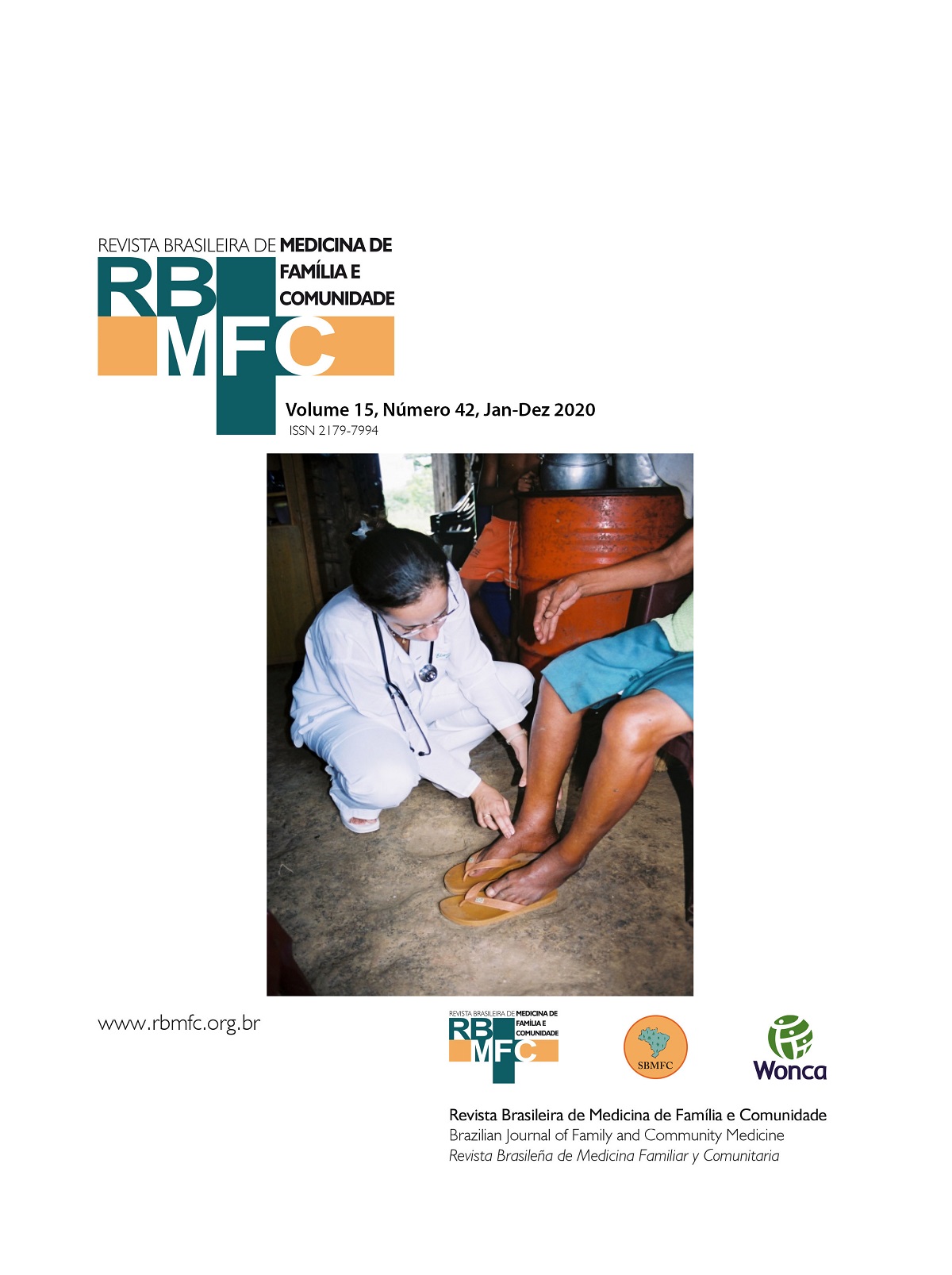A patient-centered clinical interview script for medical undergraduate teaching
DOI:
https://doi.org/10.5712/rbmfc15(42)2154Keywords:
Medical Education, Medical History Taking, Patient-Centered CareAbstract
The teaching of clinical communication skills in medical undergraduate studies finds in the principles and components of the Patient-Centered Clinical Method (PCCM) an important reference to define its competences. However, even having contact with the PCCM in undergraduate teaching, medical students often resort to the traditional medical doctor-centered anamnesis as a safer script for conducting their interviews. We propose, as a hypothesis for this difficulty, the absence of a PCCM translation into a standardized medical interview script, especially for undergraduate teaching. In this report, based on patient-centered clinical interview (PCCI) models selected from the international literature, we present the first step of an original PCCI script, adapted for the Brazilian scenario. This report aims to provide a user-friendly reference in Portuguese that can be improved by professionals involved with the teaching of clinical communication skills in higher education in Brazil. Empirical studies are still needed to support wider use of the proposal presented here.
Downloads
Metrics
References
(1) Ministério da Educação (BR), Conselho Nacional de Educação, Câmara de Educação Superior. Resolução Nº. 3 de 20 de junho de 2014. Institui diretrizes curriculares nacionais do curso de graduação em Medicina e dá outras providências. Brasília: Diário Oficial da União; 2014. p. 8-11.
(2) Stewart M, Brown JB, Weston WW, McWhinney IR, McWilliam CL, Freeman TR. Medicina Centrada na Pessoa: Transformando o Método Clínico. 3a ed. Porto Alegre: Artmed; 2017.
(3) Simpson M, Buckman R, Stewart M, Maguire P, Lipkin M, Novack D, et al. Doctor-patient communication: the Toronto consensus statement. BMJ. 1991;303(6814):1385-7. DOI: https://doi.org/10.1136/bmj.303.6814.1385
(4) Makoul G. Essential elements of communication in medical encounters: the Kalamazoo consensus statement. Acad Med. 2001;76(4):390-3. DOI: https://doi.org/10.1097/00001888-200104000-00021
(5) Noble LM, Scott-Smith W, O’Neill B, Salisbury H; UK Council of Clinical Communication in Undergraduate Medical Education. Consensus statement on an updated core communication curriculum for UK undergraduate medical education. Patient Educ Couns. 2018;101(9):1712-9. DOI: https://doi.org/10.1016/j.pec.2018.04.013
(6) Hashim MJ. Patient-Centered Communication: Basic Skills. Am Fam Physician. 2017;95(1):29-34.
(7) Frain J. Why Clinical Communication Matters? In: Cooper N, Frain J, eds. ABC of Clinical Communication. Hoboken, NJ: Wiley Blackwell; 2018.
(8) Moulton L. The Naked Consultation: A Practical Guide to Primary Care Consultation Skills. 2nd ed. Boca Raton, FL: CRC Press; 2016. DOI: https://doi.org/10.1201/9781315379463
(9) Neighbour R. The Inner Consultation: How to Develop an Effective and Intuitive Consulting Style. Lancaster Lancashire, Boston: MTP Press; 1987.
(10) Pendleton D, Schofield T, Tate P, Havelock P. A Nova Consulta - desenvolvendo a comunicação entre médico e paciente. Porto Alegre: Artmed; 2011.
(11) Ramos V. A consulta em 7 passos: Execução e análise crítica de consultas em medicina geral e familiar. Lisboa: VFBM Comunicação; 2008. DOI: https://doi.org/10.32385/rpmgf.v25i2.10609
(12) Kurtz S, Silverman J, Benson J, Draper J. Marrying content and process in clinical method teaching: enhancing the Calgary-Cambridge guides. Acad Med. 2003;78(8):802-9. DOI: https://doi.org/10.1097/00001888-200308000-00011
(13) Borrell Carrió F. Entrevista Clínica: Habilidades de Comunicação para Profissionais de Saúde. Porto Alegre: Artmed; 2012.
(14) Fortin AH, Dwamena FC, Lepisto BL, Frankel RM, Smith RC. Smith’s Patient-Centered Interviewing: An Evidence-Based Method. 4th ed. New York: McGraw-Hill Education; 2019.
(15) Cole SA, Bird J. The Medical Interview: The Three Function Approach. 3rd ed. Philadelphia, PA: Elsevier/Saunders; 2014.
(16) Smith RC, Fortin AH, Dwamena F, Frankel RM. An evidence-based patient-centered method makes the biopsychosocial model scientific. Patient Educ Couns. 2013;91(3):265-70. DOI: https://doi.org/10.1016/j.pec.2012.12.010
(17) Smith RC, Lyles JS, Mettler J, Stoffelmayr BE, Van Egeren LF, Marshall AM, et al. The effectiveness of intensive training for residents in interviewing. A randomized, controlled study. Ann Intern Med. 1998;128(2):118-26. DOI: https://doi.org/10.7326/0003-4819-128-2-199801150-00008
(18) Smith RC, Lyles JS, Gardiner JC, Sirbu C, Hodges A, Collins C, et al. Primary care clinicians treat patients with medically unexplained symptoms: a randomized controlled trial. J Gen Intern Med. 2006;21(7):671-7. DOI: https://doi.org/10.1111/j.1525-1497.2006.00460.x
(19( Lazare A, Putnam SM, Lipikin M Jr. Three function of the medical interview. In: Lipkin M Jr, Putnam SM, Lazare A, Carroll JG, Frankel RM, Keller A, et al., eds. The Medical Interview: Clinical Care, Education, and Research. New York: Springer-Verlag; 1995. DOI: https://doi.org/10.1007/978-1-4612-2488-4_1
(20) Hunziker S, Schläpfer M, Langewitz W, Kaufmann G, Nüesch R, Battegay E, et al. Open and hidden agendas of “asymptomatic” patients who request check-up exams. BMC Fam Pract. 2011;12:22. DOI: https://doi.org/10.1186/1471-2296-12-22
(21) Bjørland E, Brekke M. What do patients bring up in consultations? An observational study in general practice. Scand J Prim Health Care. 2015;33(3):206-11. DOI: https://doi.org/10.3109/02813432.2015.1067518
(22) Silverman J. Hidden agendas and how to uncover them. Medicine. 2005;33(2):27-9. DOI: https://doi.org/10.1383/medc.33.2.27.58375
(23) Stuart B, Leydon G, Woods C, Gennery E, Elsey C, Summers R, et al. The elicitation and management of multiple health concerns in GP consultations. Patient Educ Couns. 2019;102(4):687-93. DOI: https://doi.org/10.1016/j.pec.2018.11.009
(24) Zonta R, Norman AH, Tesser CD, Galhardi MP, Capeletti NM. Rastreamento, Check-Up e Prevenção Quaternária. Florianópolis: UFSC; 2017.
(25) Bradford N. Promoting a patient-centred approach in clinical consultations: Summary of a Cochrane review. Int J Nurs Pract. 2017;23(3). doi: 10.1111/ijn.12564 DOI: https://doi.org/10.1111/ijn.12564
Downloads
Published
How to Cite
Issue
Section
License
By submitting a manuscript to the RBMFC, authors retain ownership of the copyright in the article, and authorize RBMFC to publish that manuscript under the Creative Commons Attribution 4.0 license and identify itself as the vehicle of its original publication.















